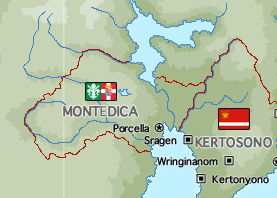Montedica
Most Serene Republic of Montedica Serenissima Repubblica di Montedica (Mantellan) | |
|---|---|
| Motto: Una Nazione, Un Popolo. One Nation, One people. | |
| Anthem: La Ritirata | |
 | |
| Capital | Porcella |
| Official languages | Mantellan, Anglish |
| Recognised national languages | Mantellan |
| Ethnic groups | 76,8% Mantellan
14,9% Surlily (Surinamese) 1,3% Native Montenzaris 1% Other |
| Religion | 81,2% !Roman Catholicism
18,0% Christian Orthodox 0,8% Other |
| Demonym(s) | Montenzari |
| Government | Unitary Presidential Republic |
• Doge | Tiziano Zito |
| Legislature | National Council |
| Establishment | |
• Colony of Mantella | 1678 |
• Republic | 1831 |
| Area | |
• Total | 257,900 km2 (99,600 sq mi) |
• Water (%) | 4,3% |
| Population | |
• 2023 estimate | 18,155,179 |
• 2022 census | |
• Density | 69.89/km2 (181.0/sq mi) |
| GDP (nominal) | estimate |
• Total | |
• Per capita | |
| Gini (2022) | 26.4 low |
| HDI | 0.863 very high |
| Currency | Montenzari Florina (MNF) |
| Date format | dd/mm/yy |
| Driving side | right |
| Calling code | +39 |
| Internet TLD | .mnt |
This article or section is in the process of an expansion or major restructuring. You are welcome to assist in its construction by editing it as well. If this article or section has not been edited in several days, please remove this template. If you are the editor who added this template and you are actively editing, please be sure to replace this template with {{in use}} during the active editing session. Click on the link for template parameters to use.
This article was last edited by Montedica (talk | contribs) 17 months ago. (Update timer) |
Montedica, officially known as the Most Serene Republic of Montedica (Italian: Serenissima Repubblica di Montedica), is a sovereign state located in the eastern coast of Alharu on Eurth. It is bordered by Kertosono in the east, and the Synthe Sea to the south. Montedica is home to an estimated 18.02 million people of whom around a fifth live in the capital city of Porcella. The country is a member of Eurth, and is regarded internationally as one of te most pacifist and neutral nations of the world, staying out of most world conflicts since its independence. The country has a total extension of 257,900, with a population density of 69/km2.
A large portion of Montedica's territories are covered by a very dense tropical rainforest, which makes populating the areas far from the coast practically impossible, as it would leave the settlements very isolated from the rest of the country, only being able to connect with other population centres via boats or air. Environmental laws also heavily restrict the development of infrastructure in those areas, only allowing small amounts of sustainable forestry and agriculture.
The country is governed as a unitary parliamentary republic, with Doge Tiziano Zito as head of state ad government and the Consiglio Nazionale as the nation's Parliament. Historically, Montedica has always been a very democratic nation, usually ranking among the most politically free in the world as a full democracy. The political sphere of the country is heavily influenced by a political way of thinking named "Oddonism", in honour of its founder, Eleanora Di Arcadia, which to this day remains as one of the most influential figures in Montenzari history, usually being named as the "Mother of the Republic". Oddonism is considered a mixture of left and right-wing policies, centered around the protection of human life and the environment, a marked anticlericalism, heavily investing in public education, and a strong emphasis on meritocracy.
Tourism is the country's main source of income, as thousands of tourists visit the country yearly to see the well-preserved rainforests that the country has to offer, with guided tours being organized every day by the Ministry of Tourism. Another very popular attraction for tourists during summer are the wonderful Montenzari beaches, especially those located in Pioratesa, as well as the very well preserved colonial architecture that can be found in almost every city of the country due to the past of Montedica as a Mantellan colony from 1678 to 1831.
Etymology
(WIP. Where does your country's name come from? Most RL national names come from a small variety of choice. Some examples: land of a tribe (ex. France, Persia, Mongolia, Russia), characteristic geography (ex. Netherlands, India, Morocco), an old ruler or religious figure (ex. Philippines, San Marino, Europa, Saudi Arabia), the Latin description of a place (ex. Australia, Argentina, Liberia). How is the name pronounced? How is the name translated into other languages?)
Geography
(WIP. Landscape. Climate. Where exactly is your country compared to others on the global map? Describe the landscape, plants, and animals. Which mountains and rivers are important to include? Describe are the climate and seasons? How does geography determine where people live? Are there areas separated from one another? How about cities? This will greatly help you with the next part of history.)
History
Pre-Colonial Era
Indigenous tribes of Montedica date back to 3,000 B.C. One of the most prominent tribes was the Alarawa tribe, a nomadic coastal tribe that lived from hunting the countless species of animals in Montedica, as well as fishing. They were one of the first to settle in the area. The Kalivhi also settled in the area, conquering the Alarawa tribe in 800 B.C. with their superior sailing ships. The large tribes that settled in modern Montedican territory were mainly based on the coasts, while smaller tribes lived inland in the rainforests that engulf 53% of Montenzari Territory.
Mantellan Establishment in Montedica
In the late 17th century, an expedition under the leadership of Captain Bencivenni Firavanti was ordered by the leaders of Mantella, with the intention of exploring the territory surrounding modern-day Montedica and its Hydrography and prepare for the establishment of a settlement that would be used as a base to export Montenzari woods and flora back home. Bencivenni was given a galleon named "Maria da Gloria" and a tartane, a small ship used both as a fishing and coastal trading ship, to start the expedition. Although the expedition came to a halt after several issues in the leadership back home, many got uninterested in the idea of a Montedican settlement. However, with Bencivenni presenting the countless treasures taken from their primary expedition, the idea of a settlement rose back.
The Mantellans there quickly drew the attention of the native people of the area, who at the start were hostile to their new neighbours, but eventually were pacified and slowly integrated into the colony and used as workforce for the developing sugar, pepper, and cotton plantations that started to appear all around the territories. The colony proved to be lucrative enough to keep its development, and eventually controlled large areas of the coastal territories and even some of the rainforest, from where large amounts of rosewood were obtained. An increasing amount of Mantellans also traveled to the new colony, with promises of great wealth and the possibility of a new life. The city of Porcella (named after the storms that ravaged the territory the first 4 days of Firavanti's arrival) soon became the new hotspot for the many new immigrants due to its excellent position on the coastline of Montedica, becoming the political and administrative center of the colony.
Independence
For most of its existence, Montedica was under several colonial powers, yet its colonialist history soon came to an end with the Declaration of Independence of Montedica. Soon after its independence, the country quickly achieved its organization, established a Republic as a form of government, consolidated its democracy, and achieved high levels of well-being and development.
Actuality
Currently, the Republic of Montedica continues to maintain many of its colonial traditions, maintaining a typically Mantellan culture that has barely differentiated. Montedica continues to be a leading country in terms of diplomacy and human rights, being usually a mediator in several international conflicts due to its strong neutrality. Montedico has been one of the first countries to legalize equal marriage in 2002 and euthanasia in 2005. As of 2008, Montedica is also one of the countries in the wurld to ban Tobacco and heavily restrict access to alcohol, relying on public campaigns to show the adverse effects of these drugs, achieving great success.
Politics
(WIP. Government. Separation of powers. Who rules, how, and for how long? Political parties. What levels of government exist? How about the local level? Who makes the laws? Who deals out your justice? Which government services exist? What is the name of your police? How are the armed forces organised? Foreign affairs, alliances, membership of international organisations.)
Economy
(WIP. Employment. Exports and imports. International partners. Currency. Energy. Transportation. Science & technology. Unemployment numbers. Tourism. Media.)
Demographics
(WIP. Demographics. Ethnic groups. Social classes. Language. Education. Marriage. Religion. Healthcare. Diseases.)
Culture
(WIP. Cuisine. Literature. Visual arts. Art. Architecture. Entertainment. Music & Radio. Television. Cuisine. Local customs. Clothing. Morality. Sports. Stereotypes. Your national symbols such as the flag and national anthem. Public holidays and festivities.)



